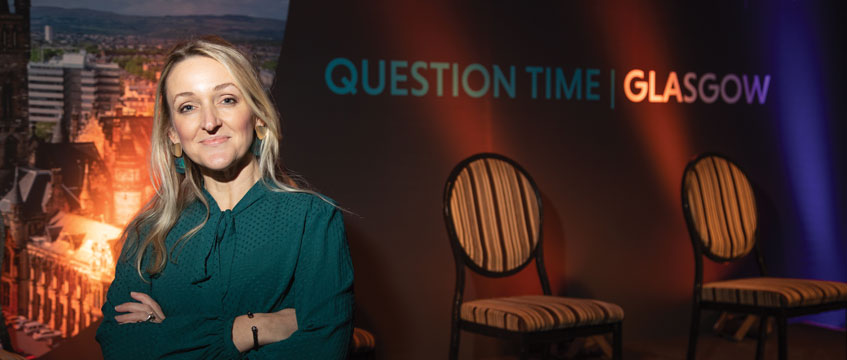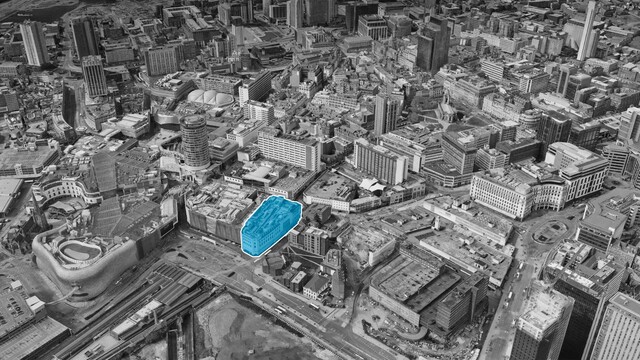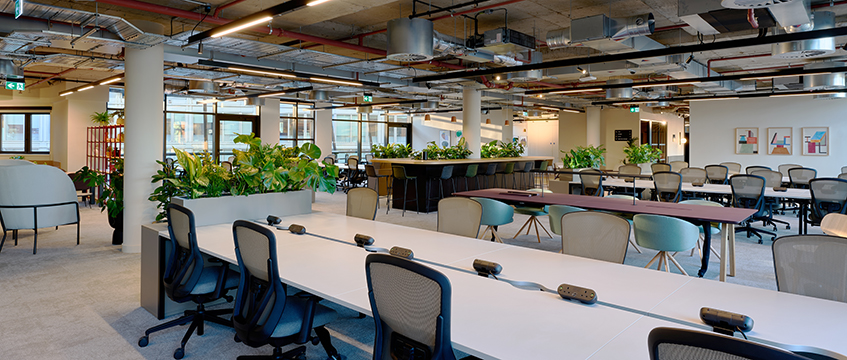Glasgow Question Time: a city still building its confidence
Confidence is said to breed success. But as a city, Glasgow seems to be quite self-deprecating about its achievements, which could be affecting its ambitions for transformation. That begs the question: why is it holding itself back?
“I think it’s quite a Scottish thing actually, about – ‘Oh gosh, better don’t tell anyone how good I am, because they’ll someday be ready to tell my mum,” Nicola Cameron, director of property development and investment at the University of Glasgow, tells delegates at EG’s Question Time Glasgow.
“We have to break from that, because we’re limiting ourselves as a city. We have got so many amazing things happening, and we need to be braver about talking about it.”
Confidence is said to breed success. But as a city, Glasgow seems to be quite self-deprecating about its achievements, which could be affecting its ambitions for transformation. That begs the question: why is it holding itself back?
“I think it’s quite a Scottish thing actually, about – ‘Oh gosh, better don’t tell anyone how good I am, because they’ll someday be ready to tell my mum,” Nicola Cameron, director of property development and investment at the University of Glasgow, tells delegates at EG’s Question Time Glasgow.
“We have to break from that, because we’re limiting ourselves as a city. We have got so many amazing things happening, and we need to be braver about talking about it.”
Perhaps Glasgow has become too used to being overlooked as a city that has often thought of itself as playing second fiddle to Edinburgh.
“There’s a Glaswegian [perception that] Edinburgh is in some way better, despite all of the surveys and stats running the other way around,” says Barry McKeown, partner at Shoosmiths, adding that the city is often “talked down”.
“Glasgow’s a bigger, metropolitan, economic community and it’s growing faster, attracting more jobs and developing faster.”
It also clearly has the ability to attract overseas investment – another factor that is downplayed. Bruce Patrick, director of development in Glasgow at Savills, says that UK institutions amounted to 20% of Glasgow’s investors this year, with the remainder being overseas buyers, led by capital from South Korea (30%). This compares with a 60% market share from domestic buyers in 2018.
“About 20% of the shareholding in my company is owned by sovereign wealth and we’re here, not in Edinburgh,” says Rick de Blaby, chief executive of developer Get Living, which last year gained consent for its £200m, build-to-rent scheme behind the High Street station. “We’ve tried Edinburgh and it’s a lot harder, and not as open-for-business as Glasgow.”
Holding out for a hero
With so much going for Glasgow, how can the real estate profession boost its self-esteem? This was a key topic at the panel session, hosted at 29 Glasgow at the Royal Exchange Square.
De Blaby says that the city needs a champion to help bring it out of the shadows, pointing to the likes of Manchester’s Sir Howard Bernstein, former chief executive of Manchester City Council, and Andy Burnham, mayor, as examples of individuals who have led the charge in promoting their city. Manchester is now widely regarded as the standard for reinvention.
“When you are trying to achieve economic growth, you’ve really got to join the dots of just about everything,” adds de Blaby. “You need to attract and sustain durable jobs, you’ve got to get the education piece right, [as well as] homes, infrastructure, leisure, arts and culture, health and public services.
“You need a champion who understands how to project a proposition, and can enable, convene and get all of those things right. A bit of resource [might be needed] to be able to do it, but it pays handsomely, as Manchester will tell you. It is about having the confidence to go out and do it.”
And while Glasgow is known for its tourism, natural resources and as “a place to come to party”, according to Patrick, not enough is made of its reputation for business and universities.
“Maybe the business community needs to come forward and promote it,” he adds.
Banking on banks
If Glasgow can find this voice, there is plenty for it to shout about, given that more heavy-hitters in the financial industry are signing up for high-quality office space.
Among these, Barclays’ investment in a new campus at Buchanan Wharf and JP Morgan’s new tech hub on Argyle Street are poised to boost the city’s resurgence when they open in 2021 and 2022, respectively.
These developments have underlined the potential for the city’s brownfield sites around its cultural quarters and knowledge institutions to become home to new, mixed-use quarters.
Patrick says that residential cap value rates in the city centre have exceeded the £375-400 per sq ft mark – enabling it to support developments with more than 12 storeys. Everybody is “dusting off their calculators and their drawings”, he adds.
Now the city needs the finance to fuel this. “There’s absolutely no doubt that in the next five years or more, you’re going to see not just one, but more than half of buildings that are going to be absolutely knock-out, world-class in Glasgow, developed in [the likes of] Candleriggs, the city centre, Broomielaw [and] Finnieston,” says Patrick.
“If we can bring the funding and finance in, and then form teams to get [these developments] out, I’m convinced it’s coming. The first office building to deliver that will be the Barclays building – it will set a new benchmark for what people perceive the Scottish market can provide.”
[gallery type="slideshow" link="none" size="full" ids="1007763,1007766,1007764,1007765,1007767,1007773,1007772,1007770,1007774,1007769,1007768,1007775"]
Fostering collaboration
For Cameron, the first step to changing broader perceptions and showcasing Glasgow as a place for investment starts at home, since it still lacks the framework to support its growth ambitions.
As she puts it: “There’s no point in going to the Expo in Dubai and saying, ‘Glasgow is open for business, please come to Glasgow and spend your money here,’ if all of [the] systems [or] the councils aren’t ready.
“We need to do more. We are on a journey. The council and economic development [leaders] absolutely recognise that, but you’ve got to have the skills to pay the bills when they eventually come here.”
Universities, too, should play an important role in the city’s regeneration. Cameron says that her team has spent a lot of time understanding what has worked in other cities including New York, Detroit and Maryland.
“We didn’t just think about building new academic buildings, but about a new urban quarter,” says Cameron.
“It is all about retaining and attracting the best and brightest talent, [and] being powerful economic contributors to our city. [It’s thinking about] how universities can be part of the story now, and part of the solution.”
Glasgow has the potential to completely transform in a way it hasn’t since the industrial revolution.
– Bruce Patrick, Savills
That applies to the real estate courses on offer in Glasgow, too. According to research from think tank Centre for Cities, Glasgow has one of the highest graduate retention rates of all UK cities: 46% of those graduating in 2013/14 or 2014/15 stayed there for work.
In terms of the property industry, however, Patrick says it is facing a “bit of a crisis” in attracting top recruits, especially when it comes to conveying why it is an appealing job for young people. The risk of losing staff to new occupiers such as Barclays and JP Morgan is also high – presenting a “real challenge” for property firms.
That said, Cameron suggests that there is a wealth of untapped potential, particularly from overseas. “Our growth in international students is increasing year-on-year,” she says. “We are a very international city; we just get on with it. We’re doing a lot of it, just not necessarily shouting about it.”
The case for showcasing
The ingredients for successfully transforming Glasgow appear to be there – the industry, it seems, just needs to be more confident about promoting itself.
“If you look at what’s happening in Glasgow now, and the potential for what Glasgow could become over the next three to seven years – it has the potential to completely transform in a way it hasn’t since the industrial revolution,” says Patrick.
“We’re doing amazing things across the whole of the city, and we should be proud of what we’ve done,” adds Cameron. The university’s focus on enhancing its spaces for nanofabrication for quantum technology is highlighted as a significant example.
“In the same way [that] we were a powerhouse in shipbuilding, we are absolutely cutting-edge in some of the new technologies, and that’s not to be sniffed at. We need to be better at showcasing that.”
Photographs by Andon Zhelyazkov
The panel
Nicola Cameron, director of property development and investment, University of Glasgow
Rick de Blaby, chief executive, Get Living
Barry McKeown, partner, Shoosmiths
Bruce Patrick, director of development, Glasgow, Savills
Chair: Samantha McClary, editor, EG
To send feedback, e-mail pui-guan.man@egi.co.uk or tweet @PuiGuanM or @estatesgazette











